World-class research hub for bio-based innovations
The BioProducts Institute boasts of state-of-the-art research facilities spread among numerous departments and buildings on the UBC Vancouver campus. These world class facilities are home to over five hundred affiliated researchers from various disciplines, who are empowered to drive innovative research in bio based materials development.


Pulp and Paper Centre (PPC)
The PPC is an inter-disciplinary, cross-faculty research centre with specialized laboratories and high-head piloting facility for those who conduct research for the benefit of the current and future pulp and paper industry. The centre serves to bring together faculty and student researchers to work collaboratively with the manufacturing industry, utilities, supplier industry, consultants and government agencies. The centre also serves as a point of entry for industry looking for innovative solutions, new technology, future employees and training programs. The Centre supports competitiveness and transformation through research and development, education and training, and through demonstration of new technology in their pilot facilities and mill trials.
The Centre contains several specialized laboratories including:
- Pulp quality evaluation lab (FQA and Microscopy, Wet Lab and Paper test lab)
- Low Consistency Refining Facility
- Pulp screening research facility
- Advanced Fibre Lab
- Papermaking Chemistry Lab
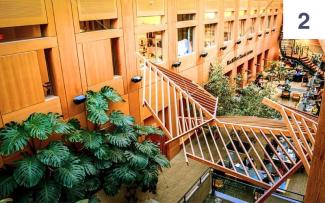
Forest Science Centre (FSC)
FSC is the home of the UBC Faculty of Forestry, boasting modern amenities such as state-of-the-art labs, a roomy atrium that offers flexible learning spaces, and multiple classrooms for diverse educational experiences.

Chemical & Biological Engineering Building (CHBE)
The facility serves as the home of the CHBE faculty, boasting modern amenities such as a spacious atrium that provides flexible learning spaces, and multiple classrooms that cater to diverse educational experiences.

Land & Food System (LFS)
The faculty of Land and Food Systems offers a range of advanced research Facilities, including farm, a food processing pilot plant, and labs for Analyzing food quality and safety, to support innovative research in the areas of agriculture, food, and environment.
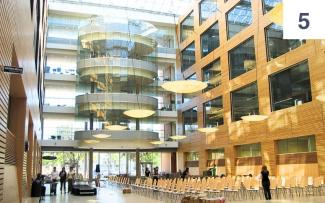
Life Science Centre (LSC)
LSC is dedicated to support translational research that makes a global impact on human health and the environment. Their interdisciplinary science changes healthcare practices and encourages sustainable resource harvesting to reduce environmental costs.
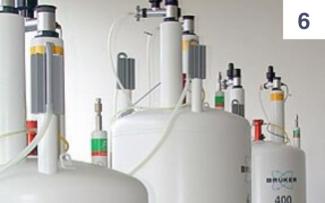
Chemistry Building (CHEM)
The Department of Chemistry features world-class research facilities, such as NMR and MS centres, clean rooms, and a high-throughput screening lab, to enable cutting-edge research in chemistry, materials science, and more.
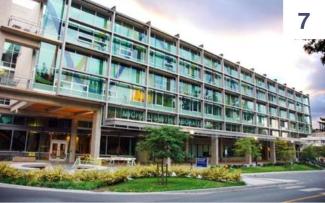
Michael Smith Laboratories (MSL)
Fundamental to the success of the MSL has been the establishment of internationally recognized research programs by our faculty members in several areas: medical and animal molecular genetics/biology, plant and forest molecular genetics/biology, bioprocess engineering, chemical biology, proteomics, micro-fluidics, bioinformatics and statistical genomics.
The exceptional breadth of expertise among Michael Smith Laboratories faculty reaches from tissue engineering to medical diagnostics, and explores organisms as diverse as bacteria, worms, mice and trees. This powerful blend of strengths and resources creates unique opportunities for cross-disciplinary approaches to the full range of exciting biotechnology issues. Many of the faculty are highly regarded leaders in their field, garnering numerous national and international awards.
Facilities include:
- Nucleic Acid Protein Service Unit (NAPS)
- Proteomics Core Facility
- BioThermodynamics Core Facility
- Michael Smith Genome Sciences Centre
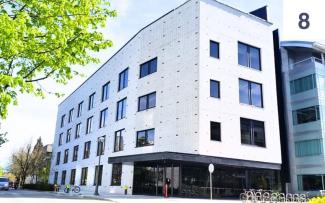
Advanced Materials and Process Engineering Laboratory (AMPEL)
AMPEL is a vibrant place for research in Advanced Materials and Process Engineering with cutting edge research that coalesces from the theoretical nanofibre physical properties to the production of advanced composites.
- The central facilities consist of:
- Surface and Interface Analysis Laboratory with various forms of electron and ion beam spectroscopy.
- High head area for process engineering experiments. The high head area provides laboratory space for large scale experiments such as casting of metals and alloys, preparation of ceramics, plasma spray oxide coatings, fluidization, and a steel run out mill.
- Nanofabrication and Cleanroom facility with apparatus for electron beam and optical lithography, thin film coating methods, electronic device fabrication.
- Machine Shop facility (co-sponsored by ICICS), consisting of an NC-equipped Machine Shop and a Small Tools Shop with versatile modelmaking capabilities.
- Metallurgical materials testing laboratory with facilities.
- Electron microscopy facility with scanning electron microscopes, transmission electron microscopes.

Clean Energy Research Centre (CERC)
CERC’s multi-disciplinary approach is dedicated to developing knowledge and solutions that will reduce the environmental impact of the use of energy, and ensuring sustainability of energy supply and use.
CERC provides state-of-the-art research facilities in a recently-completed building for the investigation of clean energy problems; the focus has grown to include energy demand, energy supply, conservation and efficiency.
A total of nine laboratories makes up CERC, they are:
- High Headroom Lab
- Fuel Cell Lab
- Clean Combustion Lab
- Clean Burning Engines Lab
- New Fuels from Biological Processes
- Reducing Energy Losses Lab
- Gas Hydrate Technologies Lab
- Renewable Energy Lab
- New Methods for Hydrogen Generation

Biorefinery Research & Innovation Centre (BRIC)
BRIC aims to reduce the barriers and risks of technology scale-up to market new biofuels and bioproducts which have been identified by industry as the largest challenges to developing successful bioproducts.

Bioenergy Research and Demonstration Facility (BRDF)
The system, fueled by biomass, creates synthesis (syn) gas that is then burned, in raw form, to produce steam or conditioned to create ultra clean syn gas that is injected into an internal combustion engine used to generate electricity.The system provides heat and power to The University of British Columbia’s Vancouver campus. It facilitates research to develop feedstock (fuel) and process innovations, set new global standards for performance and emissions and lowers the campus’s greenhouse gas emissions (GHGs) and fossil fuel consumption. The Bioenergy Research and Demonstration Facility, is a partnership between UBC and two of the world’s leading developers of green technology – Vancouver-based Nexterra Systems Corporation and GE Energy. The facility is a “Campus as a Living Laboratory” project integrating UBC’s core academic mandate (research and teaching) with the University’s infrastructure and business operations. UBC is committed to taking advantage of its unique capacity for research and problem solving to embrace and deploy leading-edge technology and concepts using the campus infrastructure as a real-world demonstration and testing lab.

Centre for Advanced Wood Processing (CAWP)
CAWP was created, in consultation with the University’s Forestry Advisory Council, with input from the National Education Initiative on the Canadian Wood Processing Industry (NEI), to address the need for advanced technical and managerial training for the value-added wood products manufacturing sector. CAWP is an interdisciplinary initiative administered by the Department of Wood Science, Faculty of Forestry, in collaboration with the Faculty of Applied Science at The University of British Columbia.
CAWP’s mission is to offer training and technical assistance to promote the success and sustainable growth of Canada’s value-added wood products manufacturing sector.
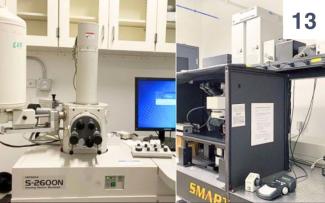
Bioimaging Facility - Room 0120 Biological Sciences Building
The UBC Bioimaging Facility helps BPI visually represent its research. Visit https://www.bioimaging.ubc.ca/ for more information.
Services and equipment include:
- Optical microscopes and electron microscopes
- Sample and image processing equipment
- Training sessions and equipment booking services
- TEM, SEM and sample preparation techniques
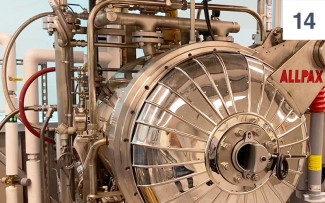
Food and Beverage Innovation Centre (FBIC)
The state-of-the-art food innovation facility is equipped with specialized labs for fermentation, food packaging, and product development, along with advanced processing equipment like retorts, microwave dryers, and ultrasonication setups.
